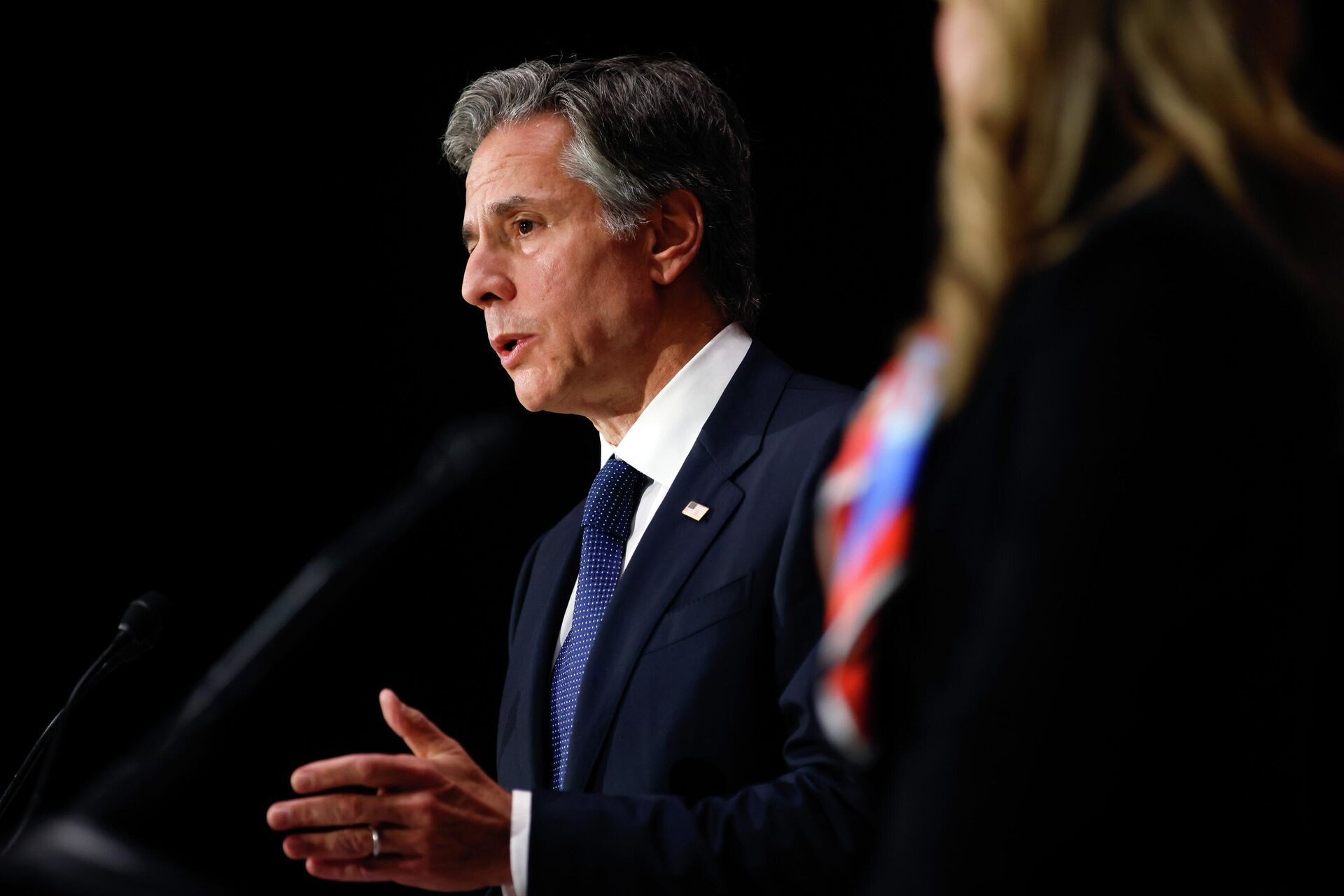https://sputnikglobe.com/20230203/blinken-failed-to-offer-steps-to-end-violence-in-middle-east-palestinian-foreign-minister-says-1106947717.html
Blinken Failed to Offer Steps to End Violence in Middle East, Palestinian Foreign Minister Says
Blinken Failed to Offer Steps to End Violence in Middle East, Palestinian Foreign Minister Says
Sputnik International
US Secretary of State Antony Blinken has urged both Israel and Palestine to ensure de-escalation of tensions, but left the region without offering any concrete measures able to amend the situation.
2023-02-03T11:16+0000
2023-02-03T11:16+0000
2024-01-30T10:26+0000
world
palestinians
russia
middle east
israel
antony blinken
sergey lavrov
riyad maliki
palestine
https://cdn1.img.sputnikglobe.com/img/07e6/08/14/1099806921_0:117:3072:1845_1920x0_80_0_0_ecb42f5b17339d8b6ecf2484e092d3ac.jpg
The US's top diplomat visited Israel and the West Bank from January 30-31 amid heightened tensions between Israel and Palestinians. It came after a brutal Israeli raid in the West Bank city of Jenin on January 26 and deadly shootings in Jerusalem over the next two days, which claimed lives on both sides.He noted that January has been "a bloody month for Palestinians," as many as 35 citizens were killed in the conflict with Israel. After the tragic events in Jenin, Blinken hastened to come in the region and see if it was possible to calm the situation down, but failed to work it out, the foreign minister recalled. Al-Maliki went on saying that Washington needed to speak to the Israelis if it wanted to resolve the situation and prevent new terrible bloodshed. Relations between Israel and Palestine have been adversarial since the latter's founding in 1948. Palestinians seek diplomatic recognition of their independent state on the territories of the West Bank, including East Jerusalem, which is partially occupied by Israel, and the Gaza Strip. The Israeli government refuses to recognize Palestine as an independent political and diplomatic entity, and builds settlements in the occupied areas despite objections from the United Nations.Relations With RussiaAl-Maliki also stressed that during his visit, Blinken did not appeal to the Palestinian leadership demanding Ramallah to condemn Russia amid the special military operation in Ukraine.Al-Maliki also noted that he was considering traveling to Moscow in the next two months at the invitation of his Russian counterpart, Sergey Lavrov.He also suggested that Russian President Vladimir Putin and Palestinian leader Mahmoud Abbas would continue their annual meetings this year, "when the time really comes and when both leaders feel that there is a need for them to meet in order to exchange views."
russia
israel
palestine
Sputnik International
feedback@sputniknews.com
+74956456601
MIA „Rossiya Segodnya“
2023
Sputnik International
feedback@sputniknews.com
+74956456601
MIA „Rossiya Segodnya“
News
en_EN
Sputnik International
feedback@sputniknews.com
+74956456601
MIA „Rossiya Segodnya“
Sputnik International
feedback@sputniknews.com
+74956456601
MIA „Rossiya Segodnya“
blinken visits israel, us-palestinian talks, blinken visits palestina, palestinian foreign minister, riad al-maliki slams blinken
blinken visits israel, us-palestinian talks, blinken visits palestina, palestinian foreign minister, riad al-maliki slams blinken
Blinken Failed to Offer Steps to End Violence in Middle East, Palestinian Foreign Minister Says
11:16 GMT 03.02.2023 (Updated: 10:26 GMT 30.01.2024) RAMALLAH (Sputnik) - As part of his official trip to the the Middle East, US Secretary of State Antony Blinken has urged both Israel and Palestine to ensure de-escalation of tensions, but eventually left the region without offering any concrete measures able to amend the situation, Palestinian Foreign Minister Riad al-Maliki told Sputnik.
The US's top diplomat visited Israel and the West Bank from January 30-31 amid heightened tensions between Israel and Palestinians. It came after a brutal Israeli raid in the West Bank city of Jenin on January 26 and deadly shootings in Jerusalem over the next two days, which claimed lives on both sides.
"Blinken told us that he has spoken to the Israeli side, and it's very important that both sides, the Israelis and the Palestinians, take measures in order really to deescalate the situation. But no concrete proposals were made. He left last night, the meeting, without any concrete measures or agreement on anything. It means that we do not see any prospects for the situation to deescalate in the next days", al-Maliki told in his interview with Sputnik.
He noted that January has been "a bloody month for Palestinians," as many as
35 citizens were killed in the conflict with Israel. After the tragic events in Jenin, Blinken hastened to come in the region and see if it was possible to calm the situation down, but failed to work it out, the foreign minister recalled.
Al-Maliki went on saying that Washington needed to speak to the Israelis if it wanted to resolve the situation and prevent new terrible bloodshed.
“The massacre that happened in Jenin was evident of what to expect from the Israeli side. It's very obvious that the Americans have come in order really to see if they can intervene in order to calm the situation down. We told them that they have to speak to the Israelis. They are the ones who are escalating the situation further. And the new Israeli government and the new ministers. They are the ones who have called for confrontation. They are the ones who have called for death to the Palestinians, the demolition of Palestinian homes, et cetera. And so if there is any way in order to deescalate is for the Israelis to stop their unilateral actions", he stated
Relations between
Israel and Palestine have been adversarial since the latter's founding in 1948. Palestinians seek diplomatic recognition of their independent state on the territories of the West Bank, including East Jerusalem, which is partially occupied by Israel, and the Gaza Strip. The Israeli government refuses to recognize Palestine as an independent political and diplomatic entity, and builds settlements in the occupied areas despite objections from the United Nations.
Al-Maliki also stressed that during his visit, Blinken did not appeal to the Palestinian leadership demanding Ramallah to condemn Russia amid the special military operation in Ukraine.
"No, this time he did not speak about Ukraine and Russia. Yes, in previous meetings, he did, not in this one because I believe he came to the conclusion that he cannot get that condemnation from us. He realized that where we stand, and that further, requesting further positions from the Palestinian side won't really change anything. So I think he came to that conclusion, and that's why he avoided being embarrassed by raising this issue again this time", the minister suggested.
"But in general, the pressure with regard to this issue is still there. Last week we were in Brussels with the Prime Minister, where we met with the 27 European foreign ministers. Some of them, not all, maybe two or three countries have raised this issue of Ukraine and Russia. But obviously we answered once again promptly and forcefully. And so they stopped raising this issue. I believe, we managed very since day one to present our positions clearly. And I think many countries realized that they cannot really extract from us any position that contradicts with our principles and where we stand in terms of our relationship with Russia tradition", he noted.
Al-Maliki also noted that he was considering traveling to Moscow in the next two months at the invitation of his Russian counterpart, Sergey Lavrov.
"Minister Sergey Lavrov, in his telephone call, invited me to Moscow and I will see when to make that visit. I always enjoy meeting with him and exchanging views and discussing bilateral relations, but also regional and international relationship. And so we'll see when that would happen. But yes, I am contemplating a visit to Moscow to meet with my colleague Sergey Lavrov, probably in the next couple of months", the minister noted.
He also suggested that Russian President Vladimir Putin and Palestinian leader Mahmoud Abbas would continue their annual meetings this year, "when the time really comes and when both leaders feel that there is a need for them to meet in order to exchange views."



